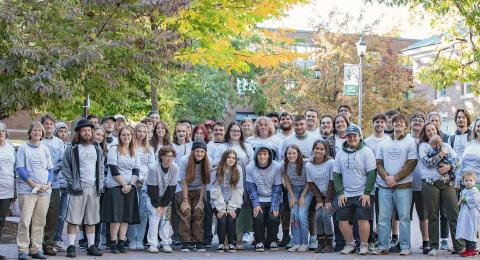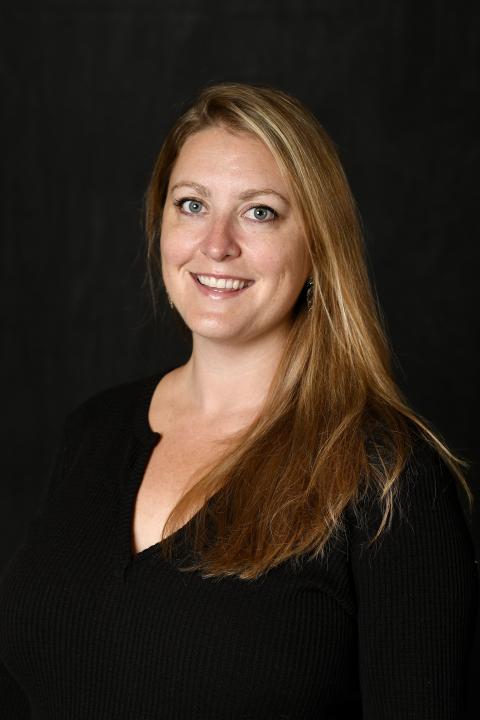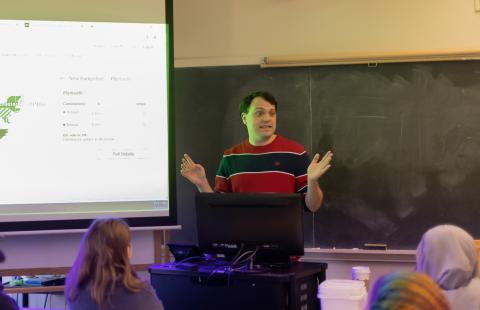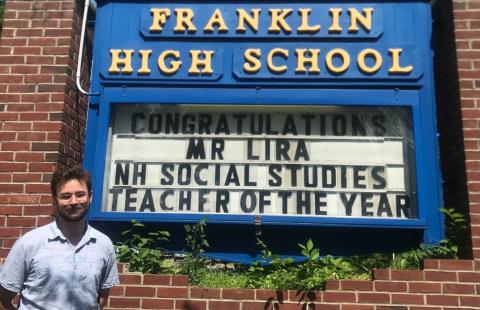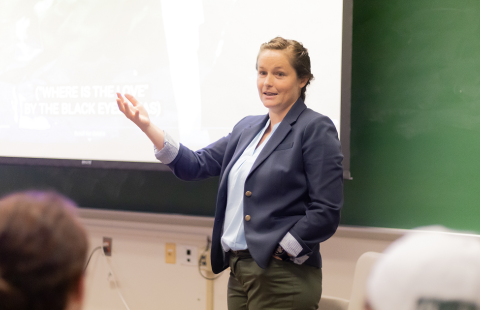Take on the challenge of mastering information about our human past.
Why do people enjoy studying history? There are many reasons: for the shock of finding familiar behavior across wide reaches of time and culture, for the puzzle of trying to understand practices alien to their own, for the challenge of mastering information about human life in the past, or for the insight to handle contemporary social concerns.
BS History and Social Studies Education majors take a shared core of four History classes to build broad historical content knowledge and the key historical skills of research, analysis, and communication.
Students in the BS History Option take five full History courses beyond the core, distributed across United States, European, and world history. Advanced historical study examines multiple dimensions of human society, both in the past and as they shape our world today. History Option students hone their abilities in intricate analysis, in-depth research, clear persuasive and narrative writing, speaking and discussion, and collaboration. Students activate these high-level skills in two Professional Applications courses, chosen from a range of disciplines, that count toward the major. Depending on requirements, up to half of a non-History minor or certificate may be completed within the major. The option’s career development sequence concludes with a 2-credit class that helps students synthesize and describe their college growth while sharpening career readiness tools.
Students who wish to pursue a teaching license choose the BS Social Studies Education (5-12) Option. Social studies courses prepare young learners for college, career, and civic life. Future social studies educators must be prepared to think deeply, critically, and adaptively about historic and current events to support their students’ understanding of a complex and ever-changing world. This option can be broken down into three themes: history, social sciences, and pedagogy. Students take the core history courses in the major and at least one other upper-level history course. Students take lower and upper-level courses in Political Science, Economics, Geography, and the behavioral sciences such as Psychology, Anthropology, or Sociology. Woven through each year in the program, students take courses in teaching methods, child development, special education, and the professionalism expected of teachers. Students work directly in schools every year and, during their last semester, they participate in a full-time teaching internship. For more information about accreditation, interstate reciprocity, and licensure requirements, see the Holmes Center for School Partnerships and Educator Preparation section of this catalog or consult the program coordinator.
Curriculum & Requirements
| Course | Title | Credits |
|---|---|---|
| Major Requirements | ||
| HI 1005 | Introduction to History and Social Studies Education | 1 |
| HI 2011 | Modern World History, 1500 to Present (GACO) | 4 |
| HI 2223 | Methods, Theories, and Careers in History (QRCO,WRCO) | 4 |
| HI 3571 | Interrogating US History (DICO,TECO) | 4 |
| Complete ONE course from the following: | 4 | |
HI 2006 | Ancient and Medieval Civilizations (GACO) | |
HI 2016 | History of Modern Europe, 1300-2000 | |
| General Education | ||
| EN 1400 | Composition | 4 |
| IS 1115 | Tackling a Wicked Problem | 4 |
| MA | Mathematics Foundations | 3-4 |
| CTDI | Creative Thought Direction | 3-4 |
| SIDI | Scientific Inquiry Direction | 3-4 |
| SSDI | Self and Society Direction | 3-4 |
| Directions (choose from CTDI, SIDI, SSDI) 1 | 4-8 | |
| IS 4220 | Signature Project (INCO,INCP) | 4 |
| Required Options in this Major | 76-78 | |
History | ||
Social Studies Education (5-12) | ||
| Total Credits | 121-131 | |
- 1
Directions should total a minimum of 16 credits because PPDI is waived for BS History and Social Studies Education.
History Option
| Course | Title | Credits |
|---|---|---|
| History Option | ||
| HI 4200 | Career Launch: Tell Your Story | 2 |
| United States History Elective (Choose one) | 4 | |
HI 3117 | Revolutionary America, 1763-1815 | |
HI 3145 | Antebellum America, 1815-1860 (DICO,INCO) | |
HI 3155 | American Civil War and Reconstruction | |
HI 3342 | New Hampshire and New England History | |
HI 3351 | Women, Gender, and Sexuality in American History (DICO) | |
HI 3355 | Health and Illness in American History (WECO) | |
HI 3357 | American Ideas (INCO) | |
HI 3359 | Law and Society in US History (DICO) | |
HI 3526 | The Great Depression in Film, Print, and On Stage: An Interdisciplinary History (DICO,INCO) | |
HI 3535 | Home Front, USA: The WWII Era in the United States (DICO) | |
HI 3815 | Topics in United States History | |
| European History Elective (Choose one) | 4 | |
HI 3230 | Topics in European History (GACO) | |
HI 3405 | Love, Sex, and Family in Medieval Europe | |
HI 3485 | The French Revolution and Napoleonic Era, 1789-1815 (GACO) | |
HI 3590 | Religious Conflict in Early Modern Europe (GACO) | |
| World History Elective (Choose one) | 4 | |
HI 3210 | History of China (GACO) | |
HI 3220 | Sex, Slavery, and Empire in Global History (GACO) | |
HI 3465 | The British Empire in World History (GACO) | |
HI 3775 | Islamic Empires (GACO) | |
HI 3825 | Topics in World History (GACO) | |
| Additional History Electives | ||
| 3000/4000 level History course | 4 | |
| Any HI course (not HIDI) | 4 | |
| WECO (may be HI) | 0-4 | |
| Professional Applications (Choose 6 to 8 credits; minimum 3 credits upper-level) | 6-8 | |
BUS 1100 | Introduction to Marketing and Sales | |
BUS 1200 | Business Law and Ethics (DICO) | |
BUS 2300 | Business Writing and Presenting (WRCO) | |
TMP 2010 | Introduction to Travel and Tourism (GACO) | |
BUS 1200 | Business Law and Ethics (DICO) | |
SAL 3280 | Professional Selling Skills I | |
SAL 3290 | Professional Selling Skills II | |
MKT 3210 | Event Planning and Marketing | |
MGM 3450 | Organizational Behavior & Team Development (DICO) | |
MKT 3130 | Digital Marketing | |
MKT 3230 | Public Relations | |
BU 4040 | Business Law II | |
CM 2405 | Public Speaking | |
CM 2775 | Media and Cultural Studies (TECO) | |
CM 2995 | Professional Social Media | |
CM 3400 | Interactive Web Communication | |
CM 3675 | Journalism in the Digital Age (TECO,WRCO) | |
EN 3040 | Practicum in Production | |
EN 3125 | Advanced Composition | |
EN 3135 | Non-Fiction Workshop | |
EPL 3100 | Environmental Planning | |
EPL 3150 | Introduction to Permaculture | |
Any French course for which the student is qualified | ||
GE 2050 | GIS I: Introduction to Geographic Information Systems (QRCO,TECO) | |
GE 3050 | GIS II: Advanced Geographic Information Systems | |
GE 4010 | Remote Sensing and Digital Image Processing | |
HI 4001 | History Internship | |
HI 4455 | History Capstone Seminar (TECO) | |
PO 3125 | Political Parties, Elections, and Interest Groups (TECO) | |
PO 3255 | Model United Nations (GACO,INCO) | |
Any Spanish course for which the student is qualified | ||
SSE 1550 | Adolescent Development and Teaching Humanities (WECO) | |
SSE 2550 | Facilitating Social Studies Lessons and Discussions | |
SSE 3550 | Lesson and Inquiry Planning in the Social Studies | |
SSE 4550 | Unit Planning and Assessment in the Humanities | |
| Electives | 45-54 | |
| Total Credits | 73-88 | |
Social Studies Education (5-12) Option
| Course | Title | Credits |
|---|---|---|
| Social Studies Education (5-12) Option | ||
| Group A (Pedagogy) | ||
| SSE 1550 | Adolescent Development and Teaching Humanities (WECO) | 3 |
| SSE 2550 | Facilitating Social Studies Lessons and Discussions | 3 |
| ED 2800 | Inclusive Education and Technology (TECO) | 4 |
| SSE 3550 | Lesson and Inquiry Planning in the Social Studies | 4 |
| Complete ONE course from the following: | 4 | |
EN 4560 | Teaching Digital Literacy, Grades 5–12 | |
EN 4318 | Teaching Writing: Grades 5–12 | |
| SSE 4550 | Unit Planning and Assessment in the Humanities | 4 |
| Group B (Social Studies Content) | ||
| HISSE core Major Requirements (HI 1005, HI 2011, HI 2006 or HI 2016, HI 2223, and HI 3571) | ||
| PO 1025 | American Government | 4 |
| Complete ONE course from the following: | 3-4 | |
PO 1035 | World Politics (GACO) | |
GE 2200 | Human Geography | |
| SO 3130 | Economic Diversity and Inequality | 4 |
| EC 3400 | Economics for Educators | 3 |
| Upper-Level Elective Social Studies Content | ||
| Complete a minimum of 4 credits in HI: | 4 | |
| HI | History (not HIDI) | |
| Complete a minimum of 8 credits in the following disciplines: | 8 | |
AN | Anthropology (not ANDI) | |
EC | Economics (not ECDI) | |
GE | Geography (not GEDI) | |
HI | History (not HIDI) | |
PO | Political Science (not PODI) | |
PS | Psychology (not PSDI) | |
SO | Sociology (not SODI) | |
| Electives | 10 | |
| Group C (Student Teaching) | ||
| SSE 4630 | Social Studies Seminar | 1 |
| SSE 4640 | Internship in Secondary Social Studies | 12 |
| Total Credits | 71-72 | |
- 1
Groups A, B, and C courses require a minimum grade of C in the SSE Option. HI Major Requirements are considered part of Group B.
- 2
SSE courses in Group A should be taken in sequence.
- 3
A minimum 2.75 cumulative GPA, C minimum in Groups A/B courses, and passed Praxis Core are requisite to entry into SSE 3550 and 4550.
- 4
A minimum 3.0 cumulative GPA, C minimum in Groups A/B courses, and passed Praxis II are requisite to entry in SSE 4630 and SSE 4640.
Check all course descriptions for prerequisites before planning course schedule. Course sequence is suggested but not required.
To complete the bachelor’s degree in 4 years, you must successfully complete a minimum of 15 credits each semester or have a plan to make up credits over the course of the 4 years. For example, if you take 14 credits one semester, you need to take 16 credits in another semester. Credits completed must count toward your program requirements (major, option, minor, certificate, general education or free electives).
History Option
| Year One | Credits | |
|---|---|---|
| EN 1400 | Composition | 4 |
| IS 1115 | Tackling a Wicked Problem | 4 |
| MA | Mathematics Foundations | 3-4 |
| HI 2011 | Modern World History, 1500 to Present (GACO) | 4 |
| HI 2016 or HI 2006 |
History of Modern Europe, 1300-2000 or Ancient and Medieval Civilizations (GACO) |
4 |
| CTDI | Creative Thought Direction | 3-4 |
| SSDI | Self and Society Direction | 3-4 |
| Electives | 5 | |
| Credits | 30-33 | |
| Year Two | ||
| HI 2223 | Methods, Theories, and Careers in History (QRCO,WRCO) | 4 |
| HI 3571 | Interrogating US History (DICO,TECO) | 4 |
| SIDI | Scientific Inquiry Direction | 3-4 |
| Directions (choose from CTDI, SIDI, SSDI) | 4-8 | |
| Professional Applications | 3-4 | |
| Electives | 10 | |
| Credits | 28-34 | |
| Years Three and Four | ||
| European 3000/4000 Level History course | 4 | |
| United States 3000/4000 level course | 4 | |
| World 3000/4000 level History course | 4 | |
| 3000/4000 level History course (not HIDI) | 4 | |
| Any level History course (not HIDI) | 4 | |
| HI 4200 | Career Launch: Tell Your Story | 2 |
| Professional Applications | 3-4 | |
| IS 4220 | Signature Project (INCO,INCP) | 4 |
| WECO | Wellness Connection | 0-4 |
| Electives | 31 | |
| Credits | 60-65 | |
| Total Credits | 120 | |
Social Studies Education (5-12)
| Year One | ||
|---|---|---|
| Fall | Credits | |
| EN 1400 | Composition | 4 |
| MA | Mathematics Foundations | 3 |
| IS 1115 | Tackling a Wicked Problem | 4 |
| SIDI | Scientific Inquiry Direction | 4 |
| HI 1005 | Introduction to History and Social Studies Education | 1 |
| Credits | 16 | |
| Spring | ||
| CTDI | Creative Thought Direction | 4 |
| SSE 1550 | Adolescent Development and Teaching Humanities (WECO) | 3 |
| ED 2800 | Inclusive Education and Technology (TECO) | 4 |
| HI 2011 | Modern World History, 1500 to Present (GACO) | 4 |
| Credits | 15 | |
| Year Two | ||
| Fall | ||
| SSDI | Self and Society Direction | 4 |
| PO 1025 | American Government | 4 |
| HI 2223 | Methods, Theories, and Careers in History (QRCO,WRCO) | 4 |
| SSE 2550 | Facilitating Social Studies Lessons and Discussions | 3 |
| Credits | 15 | |
| Spring | ||
| Directions (choose from CTDI, SIDI, SSDI) | 4 | |
| PO 1035 or GE 2200 |
World Politics (GACO) or Human Geography |
4 |
| HI 3571 | Interrogating US History (DICO,TECO) | 4 |
| Upper HI | 4 | |
| Credits | 16 | |
| Year Three | ||
| Fall | ||
| Elective | 4 | |
| INCP | Integrated Capstone | 4 |
| SSE 3550 | Lesson and Inquiry Planning in the Social Studies | 4 |
| HI 2006 or HI 2016 |
Ancient and Medieval Civilizations (GACO) or History of Modern Europe, 1300-2000 |
4 |
| Credits | 16 | |
| Spring | ||
| Elective | 4 | |
| SO 3130 | Economic Diversity and Inequality | 4 |
| EC 3400 | Economics for Educators | 3 |
| EN 4560 | Teaching Digital Literacy, Grades 5–12 | 4 |
| Credits | 15 | |
| Year Four | ||
| Fall | ||
| Elective | 2 | |
| Upper SS | 4 | |
| Upper SS | 4 | |
| SSE 4550 | Unit Planning and Assessment in the Humanities | 4 |
| Credits | 14 | |
| Spring | ||
| SSE 4630 | Social Studies Seminar | 1 |
| SSE 4640 | Internship in Secondary Social Studies | 12 |
| Credits | 13 | |
| Total Credits | 120 | |
Students will be able to:
- locate historical and scholarly sources using electronic and print media;
- analyze and evaluate primary and secondary sources;
- communicate effectively through polished narrative, persuasive, and analytical writing and presentations;
- identify the significance of key ideas and issues, periods and people, events and movements in world history;
- identify the significance of key ideas and issues, periods and people, events and movements in European history;
- identify the significance of key ideas and issues, periods and people, events and movements in United States history;
- demonstrate an understanding of the range of careers and contributions beyond the classroom that draw on the skills and knowledge developed through historical study.
Explore Program Details
National History Day New Hampshire
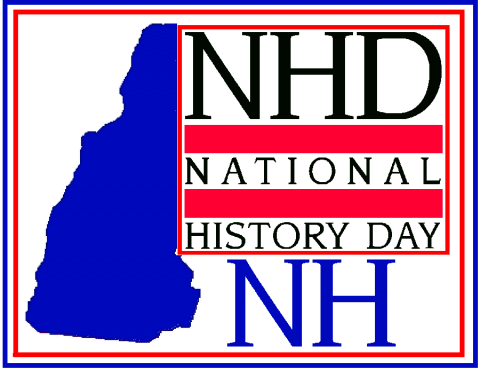
National History Day (NHD) is an educational program which encourages middle and high school students to celebrate their skills as historians and exposes them to the processes, sources, and complexities of historical research. Nearly one million students participate nationwide. For information on the national program, visit the National History Day site. New Hampshire’s program has been hosted by PSU since 2003.
Co-curricular or extra-curricular, NHD succeeds in proving true the axiom: learning by doing. Working as individuals or in groups, students (grades 6-8 and 9-12) choose a topic relating to a nationally established annual theme. Students investigate their topic, develop a thesis, and interpret primary and secondary sources to apply it to the national theme. These students then bring history to life in meaningful ways by presenting their project in one of the four formats. For more specific information, visit the National History Day New Hampshire site.
“I’ve made great friends with colleagues from different schools; I’ve developed strong, lasting, positive relationships with students who compete. Many former participants still stay in touch with me.”
— A New Hampshire teacher
Explore Today.
Realize Tomorrow.

